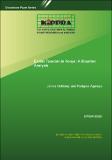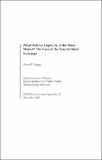Discussion Paper No. 52 of 2005 on Implicit Taxation of Agricultural Sector in Kenya
Publication Date
2005Author
Type
KIPPRA Publicationsviews
downloads
Metadata
Show full item recordBy
Ronge, Eric; Wanjala, Bernadette; Njeru, James & Ojwang'i, Douglas
Abstract/
Over the years, a number of policies have been designed and implemented to ensure agriculture continues to play an important role in economic development. This paper discusses the policies that have guided the agricultural sector in Kenya since independence, indicates their impact on the development of the sector and recommends policy changes that can more effectively enhance taxation of agriculture and its role in achieving economic development objectives. Among the key findings of the study is that while the agriculture sector in Kenya can be taxed directly through use of personal and income taxes, indirect taxation through trade taxes (export and import taxes), consumption taxes and land taxes have historically been favoured owing to their ease in implementation. However, with libernlizntion, the use of trade and consumption taxes has been on the decline, with most commodities being zero-rated. Agriculture is now taxed implicitly through changes in macroeconomic policies. This means that macroeconomic policy makers need to be aware of the implicit tax effect on agriculture. The study recommends that regular efforts be made by the government to ensure that macroeconomic policies do not unfairly impinge on agriculture. The government shoitld also explore a system of land taxation because land taxation is one of the most efftcien t methods of not only taxing agriculture but also for providing the motivation for modernization and utilization of idle land.
Subject/
Agricultural Sector; Indirect Taxation; Direct Taxation; Trade Ratios; Real Exchange Rate
Publisher
The Kenya Institute for Public Policy Research and AnalysisSeries
DP/52/2005;Collections
- Discussion Papers [346]
Related items
Showing items related by title, author, creator and subject.
-
Discussion Paper No. 241 of 2020 on Excise Taxation in Kenya: A Situation Analysis
Ochieng, James & Agwaya Rodgers (The Kenya Institute for Public Policy Research and Analysis (KIPPRA), 2020)Excise taxes are an important source of revenue in most developing countries including Kenya. Excise taxes constitute a significant proportion of revenue in Kenya, between 1980 and 2018, excises in Kenya yielded an average ... -
Policy Brief No. 04 of 2001 on Beer Excise Tax in Kenya: An Assessment
The Kenya Institute for Public Policy Research and Analysis (KIPPRA) (The Kenya Institute for Public Policy Research and Analysis (KIPPRA), 2001)In Kenya, the excise tax on beer contributes a significant share to government revenue. The government is therefore interested in establishing the optimal excise tax rates for the different types of beer: lagers and ... -
Discussion Paper No. 29 of 2003 on What Defines Liquidity of the Stock Market? The Case of the Nairobi Stock Exchange
Ngugi, Rose W. (The Kenya Institute for Public Policy Research and Analysis (KIPPRA), 2003)Liquidity of the stock market is vital if the market is to play a significant role in the development by facilitating mobilisation of long-term capital. During the revitalisation period, a lot of efforts have been made ...




